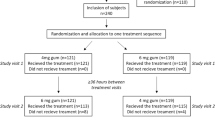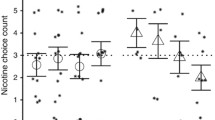Abstract
This study tested the ability of nicotine to alleviate the tobacco withdrawal syndrome. Signs and symptoms of tobacco withdrawal were measured in 100 smokers who fulfilled DSM-III criteria for tobacco dependence and a past history of tobacco withdrawal. After 2 evenings of baseline measurement, subjects were randomly assigned to receive either nicotine or placebo gum in a double blind manner. Subjects then stopped smoking, chewed gum freely, and returned on the 1st, 2nd, and 4th evenings of abstinence for further measurement. Nicotine reduced the increase in irritability, anxiety, difficulty concentrating, restlessness, impatience, and somatic complaints that subjects reported after cessation. Reductions in these withdrawal symptoms by nicotine were confirmed by ratings of significant others and by subjects' scores on the Profile of Mood States. Nicotine did not reduce the increases in cigarette craving, hunger, eating, insomnia, tremulousness, or supine heart rate after cessation. The effects of nicotine occurred immediately and persisted throughout the study. Although many subjects correctly identified their drug group, the efficacy of the gum was independent of subjects' identifications of drug. The relief of tobacco withdrawal by nicotine gum suggests that the tobacco withdrawal syndrome is caused, in part, by nicotine deprivation.
Similar content being viewed by others
References
American Psychiatric Association (1981) Diagnostic and Statistical Manual of Mental Disorders, Third Edition, American Psychiatric Association, Washington, pp 159, 176
Brownell KD, Stunkard AJ (1982) The double-blind in danger: Untoward consequences of informed consent. Am J Psychiatry 139:1487–1489
Carskadon MA, Dement WC, Mitler MM, Guilleminault MD, Zarcone VD, Spiegel R (1976) Self-report vs. sleep lab findings in 122 drug free subjects with complaints of chronic insomnia. Am J Psychiatry 133:82–88
Evans RI, Hansen WB, Mittelmark M (1979) Increasing the validity of self-reports of smoking behavior in children. J Appl Psychol 4:21–30
Fagerstrom K-O (1978) Measuring degree of physical dependence to tobacco smoking with reference to individualization of treatment. Addict Behav 3:235–241
Falk JL (1970) The nature and determinants of adjunctive behavior. Physiol Behav 6:577–588
Gritz ER (1980) Smoking behavior and tobacco abuse. In: Mello NK (ed) Advances in substance abuse, vol 1. JAI Press, Greenwich, Conn, p 91
Hatsukami D, Hughes JR, Pickens RW (1984) Characterization of nicotine dependence and abstinence: Physiological and subjective effects. In: Grabowski J, Hall S (eds) Pharmacological adjuncts in the treatment of tobacco dependence. NIDA Research Monograph. US Govt Print Off, Washington, in press
Hughes JR, Hatsukami D (1984) Short term effects of nicotine gum. In: Grabowski J, Hall S (eds) Pharmacological adjuncts in the treatment of tobacco dependence, NIDA Research Monograph. US Govt Print Off, Washington, in press
Hughes JR, Frederiksen LW, Frazier MA (1976) A carbon monoxide analyzer for measurement os smoking behavior. Behav Ther 9:293–296
Ikard FF, Green DE, Horn D (1969) A scale to differentiate between types of smoking as related to the management of affect. Int J Addict 4:649–659
Jaffe JH, Jarvik ME (1978) Tobacco use and tobacco use disorder. In: Lipton MA, DiMascio A, Killam KF (eds) Psychopharmacology: a generation of progress. Raven, New York, p 1665
Jarvik ME (1981) Biological factors underlying the smoking habit. In: Javik ME, Cullen JW, Gritz ER, Vogt TM, West LJ (eds) Research on smoking behavior, NIDA, Research Mono 17, DHEW Publ No (ADM) 78-581. US Govt Print Off, Washington, p 122
Johnson WG, Hughes JR (1979) Mazindol: Its efficacy and mode of action in generating weight loss. Addict Behav 4:237–244
Marlatt GA, Rohsenow DJ (1980) Cognitive processes in alcohol use: Expectancy and the balanced placebo design. In: Mello NK (ed) Advances in substance abuse, vol 7. JAI Press, Greenwich, Conn, p 159
McNair DM, Lorr M, Droppleman LF (1971) Manual for the Profile of Mood States, Educational and Industrial Testing Service, San Diego
Myrsten A-L, Post B, Frankenhauser M, Johansson G (1972) Changes in behavioral and physiological activation induced by cigarette smoking in habitual smokers. Psychopharmacologia 27:305–312
Pechacek TF (1979) Modification of smoking behavior. In: Smoking and Health: A Report of the Surgeon General, DHEW Publ No (PHS) 79-50066, Washington, p 19–21
Russell MAH, Feyerabend C (1978) Cigarette smoking: A dependence on high nicotine boli. Drug Metab Rev 8:29–57
Russell MAH, Raw M, Jarvis MJ (1980) Clinical use of nicotine chewing gum. Br Med J 1:1599–1622
Schachter S (1978) Pharmacological and psychological determinants of smoking. Ann Int Med 88:104–114
Schneider NG, Popek P, Jarvik ME, Gritz ER (1977) The use of nicotine gum in smoking cessation. Am J Psychiatry 134: 439–440
Shiffman SM (1979) The tobacco withdrawal syndrome. In: Krasnegor NA (ed) Cigarette smoking as a dependence process, NIDA Research Mono 23, DHEW Publ No (ADM) 97-800. US Govt Print Off, Wasjington, p 158
Author information
Authors and Affiliations
Additional information
This study was funded by a grant from Merrell Dow Pharmaceuticals, Inc. and by funds for psychiatric research from the State of Minnesota
Rights and permissions
About this article
Cite this article
Hughes, J.R., Hatsukami, D.K., Pickens, R.W. et al. Effect of nicotine on the tobacco withdrawal syndrome. Psychopharmacology 83, 82–87 (1984). https://doi.org/10.1007/BF00427428
Received:
Accepted:
Issue Date:
DOI: https://doi.org/10.1007/BF00427428




